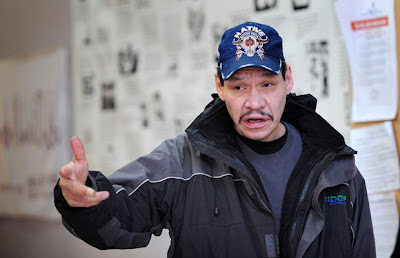Those who imbibe Listerine, hand sanitizer and rubbing alcohol want a peer-run illicit alcohol drinker's lounge established in the Downtown Eastside.
"It's like an Insite [supervised injection site] for illicit drinkers," said Nicole Latham, community developer with the Eastside Illicit Drinkers Group for Education, or E.I.D.G.E., that was formed in late July through the Vancouver Area Network of Drug Users, or VANDU.
The more than 20 members of E.I.D.G.E. envision a program that would provide free legal alcohol to those addicted to using substances with low prices and high alcohol content that aren't meant to be ingested. They want the lounge to be peer-run and to provide referrals to other health services.
Alcohol maintenance programs have run in other jurisdictions for years. A medical student and PhD candidate from the University of B.C. is working with the E.I.D.G.E. group that meets once a week except following welfare Wednesday when few participants show up after receiving their monthly cheque.
Vancouver Coastal Health is running a pilot alcohol maintenance program for illicit alcohol drinkers that started in August. The Managed Alcohol Program operates at PHS Community Services' subsidized housing on Station Street.
Eight of 80 residents who are chronic drinkers that have relapsed after detox are given vodka, beer or wine every hour for 12 hours. They also received counselling.
MAP aims to reduce emergency room visits, encounters with police and the number of drinks each participant consumes.
Mark Townsend of PHS says the program costs roughly $350 per person per month.
"What that means if they're not going to the hospital once, we've saved the money instantaneously," he said.
Dr. Ronald Joe, medical manager of Inner City Addictions for Vancouver Coastal Health, said the program's most troubled client visited the emergency room every three days.
Some favour rubbing alcohol because it provides the highest alcohol content for the buck. Joe said clients can buy a 250 ml bottle of 95 per cent rubbing alcohol for $3, dilute and drink it for an equivalent of 30 standard drinks, say 30 beer or 30 servings of wine.
"Our worst clients are drinking two or three or four of these [bottles] a day, so we're talking about 120 drinks a day," he said.
PHS has operated alcohol maintenance programs in the past, but this is the first time a program has been run in a more scientific way that's based on clinical evidence with Vancouver Coastal Health and researchers from the University of Victoria.
Joe says participants appear, on average, to have reduced the number of drinks they consume by half and they've shifted from illicit to beverage alcohol. Their health seems to be improving and they are causing fewer disturbances for other residents at Station Street.
"The public- wants a quick fix," Joe said. "-We need to think of it in a completely different paradigm. It's a chronic disease, it's a relapsing condition and we need to better help people recover where they're at."
crossi@vancourier.com Twitter: @Cheryl_Rossi
© Copyright (c) Vancouver Courier







